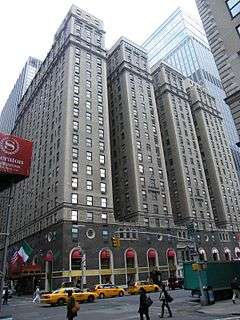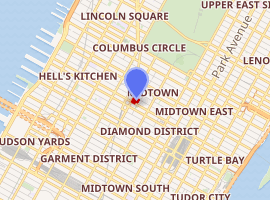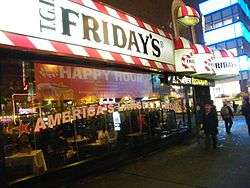The Michelangelo
The Taft Hotel is a 22-story pre-war Spanish Renaissance structure that occupies the entire eastern side of Seventh Avenue between 50th and 51st Street, just north of Times Square, in New York City. In its modern configuration, it features two separate and distinct uses, each with their own entrance on 51st St. The first and largest portion of building is devoted to the residential condominium called Executive Plaza, with each of its 440 units being privately owned. Certain units are rented by their owners to the public through the Oakwood brand.[1] Sharing a smaller portion of the building is The Michelangelo, a Starhotels hotel.
| The Taft Hotel Building | |
|---|---|
 The historic Taft Hotel building in 2009 | |

| |
| Hotel chain | Starhotels |
| General information | |
| Location | Manhattan, New York City |
| Address | 152 West 51st Street |
| Opening | 1926 |
| Management | Starhotels |
| Height | 226 ft |
| Technical details | |
| Floor count | 22 |
| Design and construction | |
| Architect | H. Craig Severance |
| Other information | |
| Number of rooms | 178 |
Manger Hotel
The building was designed by H. Craig Severance and opened in 1926 as the Manger Hotel, a major hotel chain of the period.[2] It was connected to the famous Roxy Theatre, a movie and stage show palace of the same time. The lobby of the Roxy was actually located in the 50th St and Seventh Avenue corner of the hotel building. On opening, the hotel offered 2,250 rooms and was the largest hotel in Times Square. The development cost more than $10 million (equivalent to more than $144 million in 2019), an enormous amount of money at the time. Madison Square Garden was a block to the west and drew thousands for major events.
Taft Hotel
It was renamed for President William Howard Taft in 1931 after being sold.[3]
One of the hotel's most famous features was the Taft Grill.
The George Hall Orchestra (sometimes called the George Hall Taft Hotel Orchestra) performed from the hotel on Monday through Saturday at noon on CBS Radio, starring Dolly Dawn.[4] The band's signature song was "Love Letters in the Sand".
Other big band performances were by Artie Shaw, Xavier Cugat, Tommy and Jimmy Dorsey, Glenn Miller, and Tony Pastor.[5]
Vincent Lopez performed in residency for 20 years and broadcast a radio show from the hotel, with Gloria Parker, Shake the Maracas. Lopez later broadcast a TV show from the Taft on the DuMont Television Network, Dinner Date, from January to July 1950.
On May 26, 1933, Jimmie Rodgers (the Father of Country Music) died here at the age of 35 from a long battle with tuberculosis. This occurred just two days after completing what was his final recording session for Victor Records.
In 1955, Philip Loeb died from an overdose of sleeping pills at the hotel in the Hollywood blacklist scandal.
A scene from the 1967 film How to Succeed in Business Without Really Trying, in which Finch follows a rival executive to a football pep party, was shot at the hotel.
Grand Bay Hotel, Parc FiftyOne, The Michelangelo, Executive Plaza

The demolition of Madison Square Garden and the Roxy Theatre, and the increasing presence of unsavory businesses and the desire for newer more elegant hotels contributed to the early 1980s closing of the Taft Hotel. In 1988, following the construction of the 787 Seventh Avenue office tower, across 51st Street to the north, the hotel was converted to mixed use. The eighth through the 21st floors were rebuilt as condominiums and the first seven floors were occupied by the Grand Bay Hotel. The hotel and the condominiums had separate entrances side by side on 51st Street.[3]
In 1990, hotel chain Park Lane International acquired the hotel portion and renamed it Parc Fifty-One. In 1992, Starhotels acquired it for $42 million and renamed the hotel The Michelangelo.[3]
The building also includes America's largest T.G.I. Friday's,[6] located in the space that once housed the lobby of the Roxy Theatre, and a Ruth's Chris Steakhouse facing West 51st St.
References
- https://www.oakwood.com/furnished-apartments/NEW-YORK/Executive-Plaza
- Taft Hotel - Emporis.com - Retrieved December 31, 2008
- "POSTINGS: Remember the Taft?; A StarHotel on 51st Street". The New York Times, June 28, 1992. Accessed August 12, 2009.
- Martin, Douglas. "Dolly Dawn, 86, Who Sang Center Stage in the Big Band Era". The New York Times, December 18, 2002. Accessed August 12, 2009.
- The Michelangelo Hotel. hotelbook.com. Accessed August 12, 2009.
- http://www.timessquarenewyears.com/parties-tgi-fridays-new-years.php